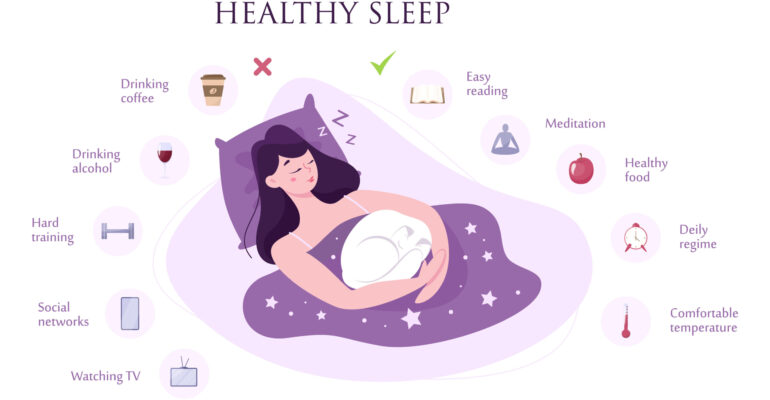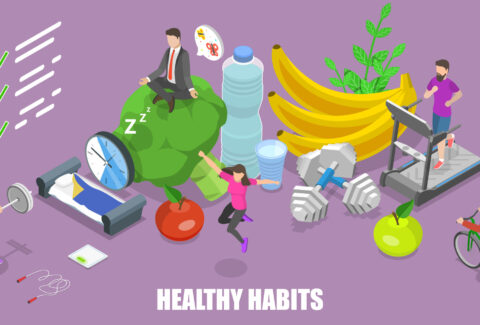The Sleep Cheat Code: How Better Rest Boosts Your Energy, Mood, and Health
In today’s fast-paced world, sleep often takes a backseat to school, social life, and screen time. But what if getting better sleep was the ultimate life hack? The truth is, sleep is not just about avoiding fatigue—it’s a powerful tool that can supercharge your energy, improve your mood, and enhance overall health.
Did you know that teenagers need between 8 to 10 hours of sleep each night, yet most barely get 6? Chronic sleep deprivation can lead to decreased concentration, higher stress levels, and long-term health problems like obesity and heart disease. The good news? Small changes can make a huge difference in your sleep quality. Let’s dive into the science of sleep and uncover the cheat codes to better rest. Many of these small changes were also covered in 5 Small Changes to Build Healthy Habits That Last a Lifetime, showing how lifestyle adjustments can impact sleep.
1. Understanding Your Sleep Cycle
Before you can improve your sleep, it’s essential to understand how it works. Sleep isn’t just one long stretch of unconsciousness—it’s a series of cycles, each playing a crucial role in how you feel when you wake up.
The 4 Stages of Sleep:
- Light Sleep (Stage 1 & 2) – Your body begins to relax, and your brain starts slowing down. This phase helps with memory and learning.
- Deep Sleep (Stage 3) – The most restorative stage, where your body repairs muscles, strengthens the immune system, and releases growth hormones.
- REM Sleep (Stage 4) – The stage where dreaming happens. REM sleep boosts brain function, creativity, and emotional regulation.
Sleep isn’t just rest—it’s your body’s time to recover, grow, and reset for the next day.
Many factors influence sleep cycles, including stress levels, hydration, and daily movement. To optimize sleep, incorporating Why Stress Sucks for Your Health and How to Manage It into your routine can help lower cortisol and allow for better rest.
How to Optimize Your Sleep Cycle:
- Stick to a schedule – Going to bed and waking up at the same time every day helps regulate your internal clock.
- Get morning sunlight – Exposure to natural light helps set your body’s sleep-wake cycle.
- Avoid late-night snacks – Eating before bed can interfere with your body’s ability to enter deep sleep.
2. The Link Between Sleep and Energy Levels
Ever noticed how a bad night’s sleep leaves you sluggish and irritable? Sleep is the ultimate energy booster. During deep sleep, your body restores glycogen levels (your muscles’ energy source) and produces ATP, the molecule that fuels your cells.
Why Sleep is Your Natural Energy Drink:
- Boosts endurance and reaction time – Essential for athletes and students needing focus.
- Improves metabolism – Poor sleep can cause insulin resistance, leading to weight gain.
- Enhances motivation – A well-rested mind is more eager to tackle challenges and stay productive.
Better sleep equals better energy—no energy drinks needed!
If you’re looking for other ways to keep your energy levels up during the day, incorporating Why Exercise is the Ultimate Power-Up for Teens into your routine can make a huge difference.
Simple Sleep Hacks for More Energy:
- Avoid caffeine after 3 PM – It stays in your system for up to 6 hours.
- Power down screens – Blue light suppresses melatonin, making it harder to fall asleep.
- Try a short nap (20-30 mins) – A quick nap can give you a mental boost without making you groggy.
3. How Sleep Affects Your Mood
Ever felt cranky after a bad night’s sleep? Sleep and mood are deeply connected. Lack of sleep increases cortisol (the stress hormone) while decreasing serotonin and dopamine, which regulate happiness.
The Emotional Benefits of Quality Sleep:
- Reduces stress and anxiety – Proper rest helps your brain process emotions more effectively.
- Boosts emotional resilience – Sleep helps you handle social situations with ease.
- Prevents mood swings – A well-rested mind makes it easier to stay calm and focused.
Good sleep isn’t just about resting—it’s about recharging your emotional well-being.
If you struggle with nighttime anxiety or overthinking, Why Stress Sucks for Your Health and How to Manage It offers practical strategies to calm your mind before bed.
Cheat Codes for a Better Mood:
- Practice mindfulness before bed – Journaling or deep breathing can ease stress.
- Create a bedtime routine – Doing the same relaxing activities before sleep signals your body it’s time to wind down.
- Avoid doom-scrolling – Social media before bed increases anxiety and keeps your brain wired.
4. Sleep and Long-Term Health: Why It Matters Now
Poor sleep isn’t just a short-term problem. Over time, it can contribute to serious health issues, including heart disease, diabetes, and weakened immunity.
The Long-Term Benefits of Prioritizing Sleep:
- Strengthens your immune system – More sleep means fewer colds and illnesses.
- Supports brain health – Sleep clears out toxins that contribute to cognitive decline.
- Promotes a healthy weight – Sleep regulates hunger hormones, preventing overeating.
A good night’s sleep today is an investment in your future health.
If you want to further optimize your health, paying attention to From Fast Food to Fresh: Easy Swaps to Eat Healthier Without Giving Up Flavor can complement good sleep hygiene by improving your diet.
5. The Ultimate Sleep Cheat Code: Building Your Perfect Sleep Routine
The best way to sleep better is to build a nighttime routine that sets you up for success.
Your Step-by-Step Sleep Routine:
- Set a bedtime alarm – Remind yourself to wind down 30 minutes before bed.
- Create a cozy sleep environment – Invest in a good mattress, blackout curtains, and a cool room temperature.
- Limit nighttime stimulants – No caffeine, intense exercise, or big meals 2 hours before bed.
- Try relaxation techniques – A warm bath, essential oils, or meditation can help signal sleep time.
- Track your sleep – Use apps like Sleep Cycle or Fitbit to monitor patterns and improve habits.
Great days start with great sleep—make it a priority!
The Bottom Line: Sleep Smarter, Live Better
Sleep is not a luxury—it’s a necessity. If you want to boost your energy, improve your mood, and protect your long-term health, prioritizing sleep is one of the best investments you can make. The best part? You don’t need to make drastic changes—small, consistent improvements can transform your sleep and your life.
As explored in 5 Small Changes to Build Healthy Habits That Last a Lifetime, forming sustainable habits is key. Start with one sleep cheat code today and experience the difference for yourself!
What’s one sleep habit you’re going to change tonight? Share your progress with us on social media, and let’s build better sleep habits together!







